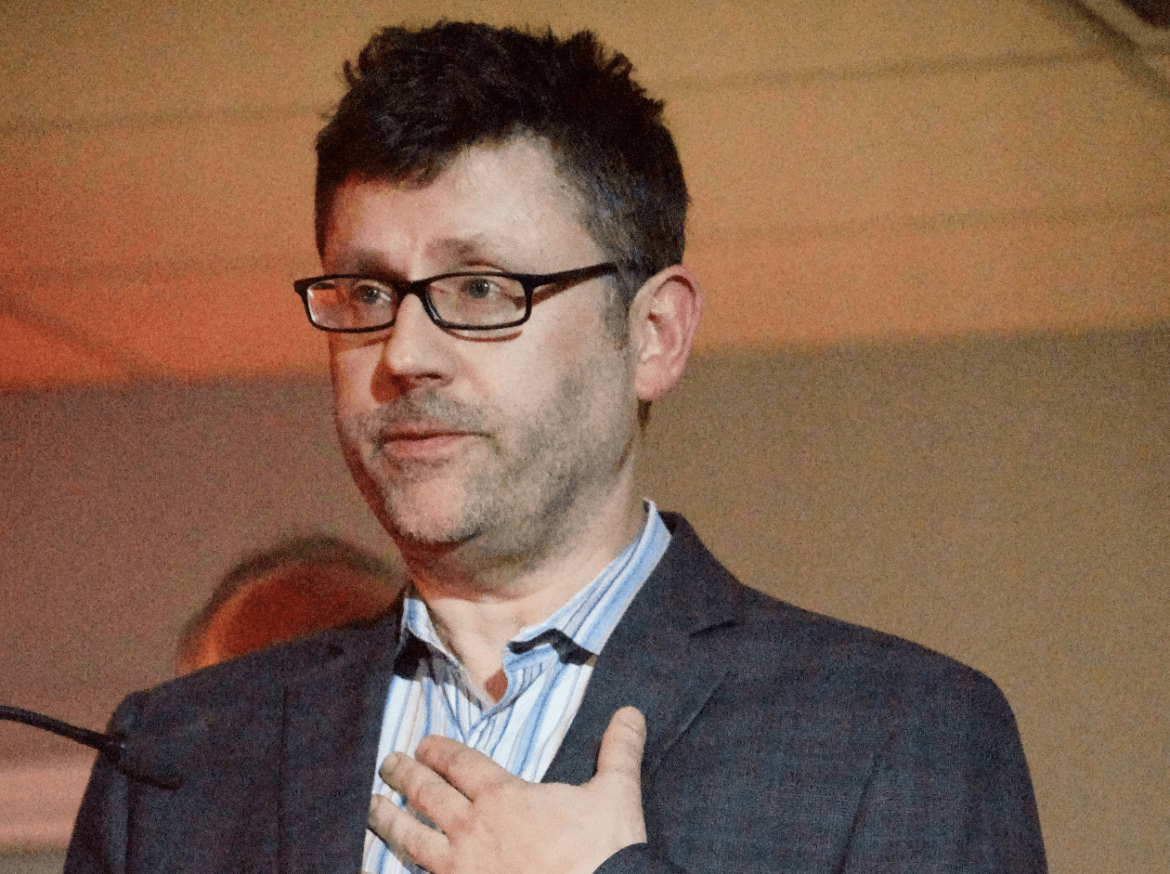By Kirsten Coachman
On Sept. 16, 2019, School of Writing for Film, TV & Digital Media Associate Director Stuart Thomas lost his battle with leukemia at the age of 49. A beloved colleague, friend, and instructor, his passing is an immeasurable loss within the Academy of Art University community.
“Stuart was an amazing teacher, friend, and colleague. His love for his students, his ever-present wit and intelligence will be missed immensely,” said Academy President Dr. Elisa Stephens. “We offer our heartfelt condolences to Stuart’s family and friends during this time.”
With over 50 credits to his name, Thomas’ creative reach spanned across theatre, film, and television. He had been a playwright-in-residence at the Citizens Theatre in Glasgow, Scotland—his home country. He received the Pearson Award for his play, “Damn’d Jacobite Bitches.” He was an experienced musician and composer, who prior to joining the Academy was the music and drama specialist for the Scottish Opera For All. Prior to his passing, one of his plays, “Tinder: A Musical Comedy,” had been staged in Dublin, Ireland, this past August.
His television writing includes BBC Scotland’s “The Big Time” and “The Stair.” In 2014, his short film, “The Cause,” directed by Marco De Luca, screened at the Cannes Film Festival. That same year, his debut feature film, “Bar America,” co-written with director Matthew Jacobs, took home the Audience Award at the Napa Film Festival. His most recent film, “Out Here,” is currently in pre-production.
As an undergraduate, Thomas studied theatre at the University of Glasgow. He attended the Academy’s School of Motion Pictures & Television (MPT) from 2005 to 2009, where he earned an M.F.A. in screenwriting. As an instructor in the Schools of Entertainment, Thomas worked alongside one of his own former instructors, Julie Oxendale, who had him in her screenwriting classes and later in directed studies.
“He was an exceptional student, I mean, exceptional,” said Oxendale via a phone interview. “I’d never met anybody who could work as effectively and quickly as Stuart did. … That’s why people wanted him to help them out because he was so quick and accurate, and creative. And that is beyond rare to have those qualities, in my opinion.”
Oxendale shared that, as an instructor, he had a unique perspective as he had been through the MPT M.F.A. program and could empathize with his students, especially those who came to the Academy from another country as he had. He was perceptive and knew when something wasn’t working storytelling-wise and was able to go about finding creative solutions in his students’ work because “he worked so prolifically at his own craft.”
“I think the students will find it refreshing that they actually had a mentor who was very honest and very straightforward with them because when they go to work in the industry, there will be lots of subtext, lots of people who can’t say exactly what they want to say because of the institutionalized nature of the industry,” she explained. “And kindness is something in my experience that can be in short supply in Hollywood, so the fact that someone could be brutally honest, [while] being motivated by kindness I think is very important.”
Oxendale expressed that she hopes that people will have the opportunity to read Thomas’ work as well as see his work both on the stage and screen. “It seems he never stopped working,” she shared. “He was someone that always had time for people. He was extremely focused and knew, as a writer, there’s no homework, you’re writing all the time.”
MPT instructor Rob Alan Martin met Thomas through the Academy early on, around 2006 while he was a student. The eventual colleagues became good friends, even sharing an office at one point.
“It was awesome working with him,” said Martin during a phone interview. “That whole period when we shared an office was amazing because we got so, so close. He was a very serious and thorough instructor but let real life and levity manifest. He did great things and the energy was light.”
Discussing Thomas’ impact at the Academy, Martin said that ultimately it was how he inspired his students and “taught them how to tap into their own history to instill three dimensions in character.”
“He inspired probably thousands of students to write compelling stories with the foundation in their own life experience,” said Martin, “so, for that, he’s changed the world, because they’re screenwriters. … That’s his lasting legacy.”
As a driven, standout screenwriting student that evolved into a thoughtful and forthcoming instructor, Thomas’ insight about his craft and tireless work ethic are sure to leave an imprint on his colleagues and students in the years to come.
“[We should] live life and impact the world,” said Martin. “That’s what he did, so it’s important for us all to do the same.”
